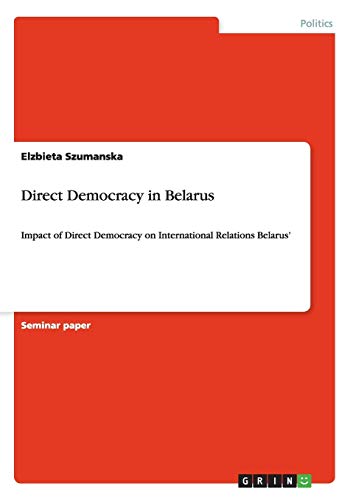Artículos relacionados a Direct Democracy in Belarus: Impact of Direct Democracy...
Direct Democracy in Belarus: Impact of Direct Democracy on International Relations Belarus' - Tapa blanda

"Sobre este título" puede pertenecer a otra edición de este libro.
- EditorialGRIN Verlag
- Año de publicación2009
- ISBN 10 3640343727
- ISBN 13 9783640343720
- EncuadernaciónTapa blanda
- Número de edición3
- Número de páginas34
Comprar nuevo
Ver este artículo
Gastos de envío:
EUR 23,00
De Alemania a Estados Unidos de America
Los mejores resultados en AbeBooks
Direct Democracy in Belarus
Descripción Taschenbuch. Condición: Neu. This item is printed on demand - it takes 3-4 days longer - Neuware -Seminar paper from the year 2009 in the subject Politics - International Politics - Region: Russia, grade: 1.0, European University Viadrina Frankfurt (Oder), course: Direct Democracy: Theory and Practice., language: English, abstract: In order to proof democratic developments in Belarus the following study will be dividedinto five different sections. The opening section positions Belarus within contemporary debateabout the concept of the Direct Democracy, with a special focus on the relevance and functionsof the institution of referendum and plebiscite.Next, the paper reviews the Belarusian referenda since president Lukashenko came topower. First, legal bases for this kind of institution must be presented. Further, detailed coursewithin the timeframe of May 1995 and October 2004 in connection with a public reaction onthem and an international appraisal will be shown.Section three of the paper then considers the historical context of Belarus with a specialfocus on the Soviet period in order to elucidate the issues mentioned. Long dependence mayexplain why there exists a big mistrust to international institutions and the West as such. Thissection presents also possible reasons of the weak Belarusian national identity and lack of thecivil society in the country.Next chapter looks after possible ways Belarus should follow. Having in mind the waythe direct democracy has been forced there via referendums that do not meet law standards, thispart will consider possible reasons and challenges for the Belarusian governance in the domainof international relations with its biggest neighbors: Russia and the European Union, from avariety of perspectives. It is essential in the debate about democratization of Belarus withoutdestroying so important economical ties with Russia.In conclusion it will be analyzed how the changes described can proof the concept of theDirect Democracy in Belarusian context. In doing so, answers on how the internationalcommunity can deal with such types of governance will be provided. Finally some interestingfindings regarding democratic changes due to an undemocratic form of governance will besummed up. 32 pp. Englisch. Nº de ref. del artículo: 9783640343720
Direct Democracy in Belarus : Impact of Direct Democracy on International Relations Belarus¿
Descripción Taschenbuch. Condición: Neu. Druck auf Anfrage Neuware - Printed after ordering - Seminar paper from the year 2009 in the subject Politics - International Politics - Region: Russia, grade: 1.0, European University Viadrina Frankfurt (Oder), course: Direct Democracy: Theory and Practice., language: English, abstract: In order to proof democratic developments in Belarus the following study will be dividedinto five different sections. The opening section positions Belarus within contemporary debateabout the concept of the Direct Democracy, with a special focus on the relevance and functionsof the institution of referendum and plebiscite.Next, the paper reviews the Belarusian referenda since president Lukashenko came topower. First, legal bases for this kind of institution must be presented. Further, detailed coursewithin the timeframe of May 1995 and October 2004 in connection with a public reaction onthem and an international appraisal will be shown.Section three of the paper then considers the historical context of Belarus with a specialfocus on the Soviet period in order to elucidate the issues mentioned. Long dependence mayexplain why there exists a big mistrust to international institutions and the West as such. Thissection presents also possible reasons of the weak Belarusian national identity and lack of thecivil society in the country.Next chapter looks after possible ways Belarus should follow. Having in mind the waythe direct democracy has been forced there via referendums that do not meet law standards, thispart will consider possible reasons and challenges for the Belarusian governance in the domainof international relations with its biggest neighbors: Russia and the European Union, from avariety of perspectives. It is essential in the debate about democratization of Belarus withoutdestroying so important economical ties with Russia.In conclusion it will be analyzed how the changes described can proof the concept of theDirect Democracy in Belarusian context. In doing so, answers on how the internationalcommunity can deal with such types of governance will be provided. Finally some interestingfindings regarding democratic changes due to an undemocratic form of governance will besummed up. Nº de ref. del artículo: 9783640343720

